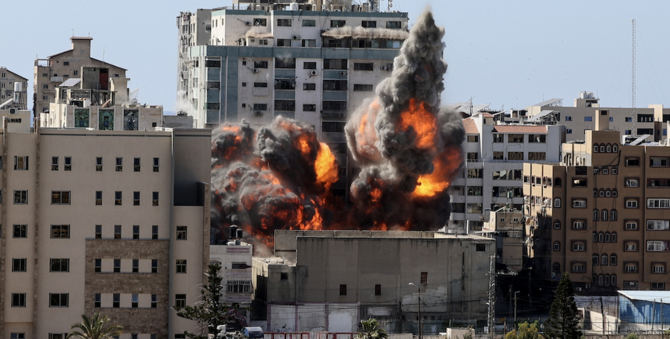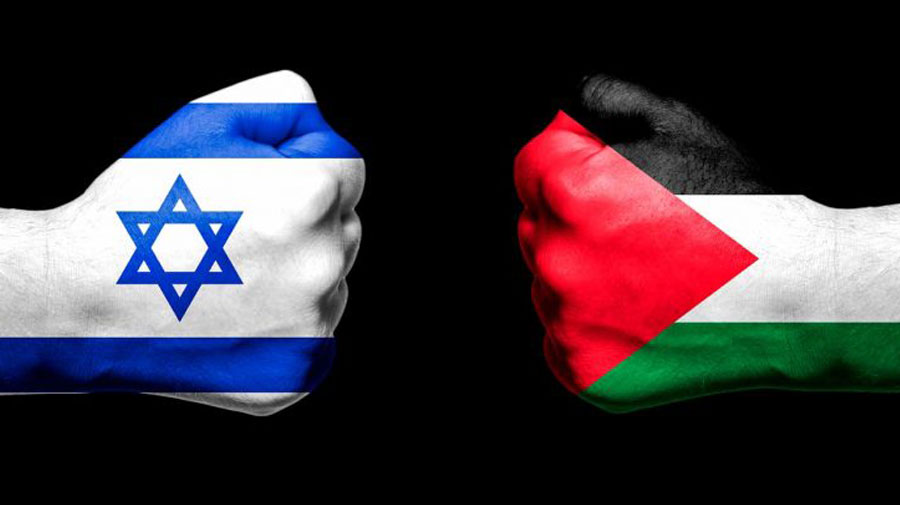Israel’s overenthusiastic military strikes on Hamas are driven by PM Netanyahu’s opportunistic desire to use war as a rallying point for his supporters of ‘Israeli nationalism’.

The latest flare-up between Israel and Hamas has once again focussed the world’s attention on one of the longest unresolved feuds in the post-war era. The flare-up has happened at a time when Israel is undergoing its politically most destabilizing phase. Four back-to-back inconclusive general elections have failed to throw up a clear majority to anyone. On the face of it, the latest confrontation may look like a new chapter in the old storybook of historical Jewish and Islamic feud. Still, once the surface is scratched, more political shenanigans emerge on the two sides as probably escalating a small confrontation into a full-fledged battle and military crisis involving the world community at such a crucial time when the whole world is fighting a war against the ravaging novel Coronavirus pandemic.

As a precursor to the latest dispute lies the fractured outcome of the March general elections this year, which, like the previous three general elections, did not give a majority to any political alliance. The caretaker Prime Minister Benjamin Netanyahu was unable to gather the necessary number of Knesset members (the Israeli Parliament) and form the government largely because his far-rightwing Israeli political partners refused to participate in a coalition government with an Israeli Arab party called United Arab List of Mansur Abbas. It is speculated that Prime Minister Netanyahu himself was not favouring Mansur Abbas joining any prospective coalition government. He is believed to have favoured continuing to serve as a caretaker Prime Minister until a new general election is held with his improved chance of winning them. This strategy would additionally give him time to postpone his corruption trial.
This is where the theatre of politics shifts to East Jerusalem, the focal point of the current flare-up, from where the whole thing began. The Sheikh Jarrah neighbourhood of East Jerusalem is inhabited predominantly by Palestinian families. Sheikh Jarrah is also located a mile away from Al-Aqsa Mosque, Islam’s third holiest shrine.
Towards the beginning of the holy month of Ramadan, the Israeli police force began using unnecessary restrictions against Palestinian worshippers in East Jerusalem. First, it prevented them from customary gathering at the Damascus Gate. It then beat up protestors at Sheikh Jarrah, where six Palestinian families were facing a legal eviction from their homes in East Jerusalem.
India has continued with its traditional support to Palestinian people and government, despite what many thought would not be the case. India’s permanent representative to the UN, T S Tirumurti, made a statement at the UN Security Council “open debate,” implicitly holding Israel responsible for triggering the current cycle of violence.
Tensions soon boiled over when Israeli forces stormed the Al-Aqsa mosque using stun grenades and rubber bullets, which left hundreds of people wounded. This is where politics begins on both sides.
Hamas, a Palestinian military cum political organization based in the Gaza strip, retaliated by firing a barrage of rockets into Israel, prompting retaliatory airstrikes by Israel. Many political analysts believe that Hamas saw this as an opportunity to redeem itself from its dwindling popularity among Palestinians and present itself as the defender of Palestinian rights.

Furthermore, analysts also believe that Prime Minister Netanyahu’s overenthusiastic military strikes at Hamas are fed by his opportunistic desire to use the war against Hamas as a rallying point of his Israeli supporters around Israeli nationalism and win a decisive victory in the next general elections.
So far, the international reaction to the fast-escalating conflict has been mixed as nations worldwide continue to grapple with the deadly consequences of the Coronavirus pandemic. The Organization of Islamic Council (OIC) has strongly condemned the bombing of Gaza by Israel, as expected, and demanded a complete and immediate stoppage of the airstrikes. Israel, on the other hand, has been supported by its historical and traditional ally, United States, with the newly elected US President Joe Biden throwing his weight behind Israel and supporting what it describes as Israel’s “right to defend”.
New Delhi abstained from a vote in the UN Human Rights Security Council that proposed to set up a commission for investigating Israel’s latest war crimes against Palestinians.
India has continued with its traditional support to Palestinian people and government, despite what many thought would not be the case. India’s permanent representative to the UN, T S Tirumurti, made a statement at the UN Security Council “open debate,” implicitly holding Israel responsible for triggering the current cycle of violence. India requested both sides to refrain from “attempts to unilaterally change the existing status quo including in East Jerusalem and its neighbourhoods”. India further reiterated that “the historic status quo at the holy places of Jerusalem including the Haram al Sharif/Temple Mount must be respected”. However, New Delhi abstained from a vote in the UN Human Rights Security Council that proposed to set up a commission for investigating Israel’s latest war crimes against Palestinians.
At the international level, the Biden administration tried, and some would say succeeded, in brokering a ceasefire by flying its officials to hold talks with the Israeli government officials.
There is a danger of violence escalating and spreading to previously relatively peaceful areas in the West Bank and other towns in Israel with mixed Arab-Jewish population. Already, the situation is said to be worsening in most Israeli towns with the Arabs population. Mass protests have been staged, and a fear of a third Palestinian “intifada” is rising.
But in the end, it is the ordinary people of Israel and Palestine. They will collectively pay a price of the desire of self-preservation by PM Netanyahu and the desire of Hamas not only to gain back its foothold in Gaza but also increase its influence in the West Bank.
The author can be reached @javedbeigh across social media platforms. The views expressed are his own.
Leave a Reply